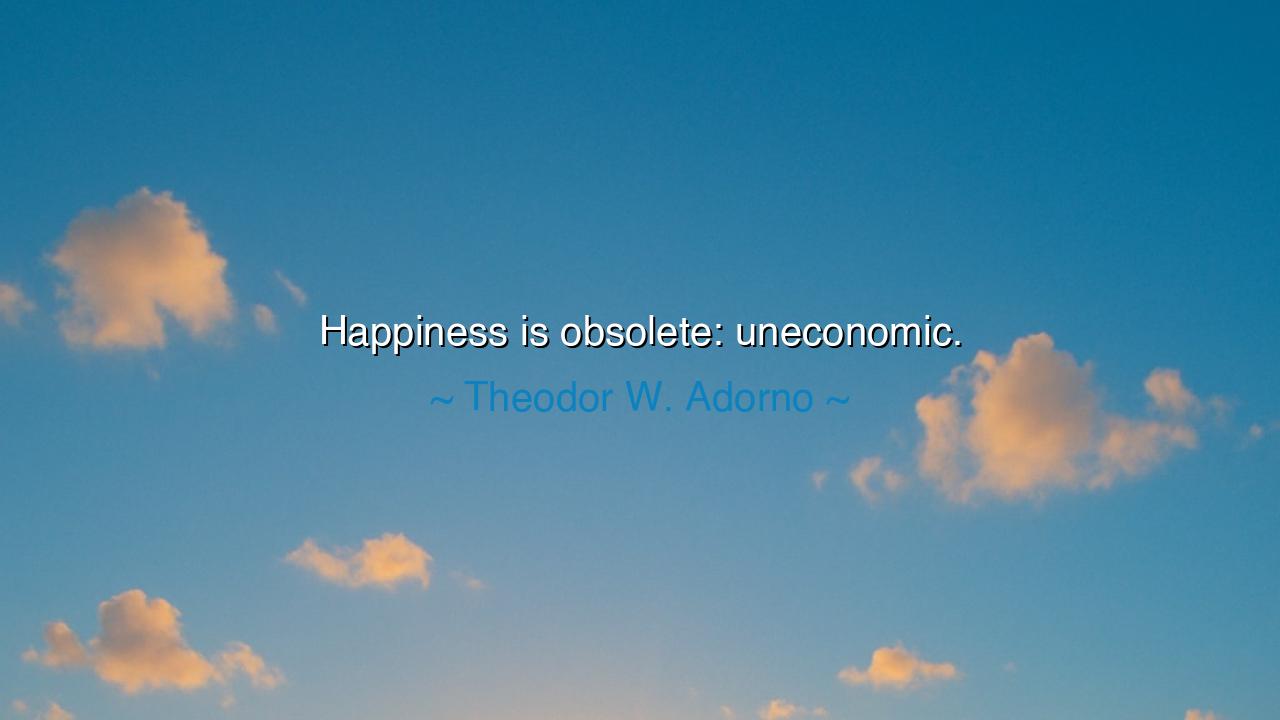
Happiness is obsolete: uneconomic.






The words of Theodor W. Adorno, “Happiness is obsolete: uneconomic,” are not the sigh of a pessimist, but the lament of a prophet who saw the soul of mankind shackled by the machinery of modern life. In this short and piercing phrase, Adorno exposes a truth that still echoes through the centuries: that in a world ruled by commerce and production, true happiness has become an inconvenience, a luxury that does not serve the engines of profit. Once, joy was the measure of a life well lived; now it is measured, priced, and sold. The philosopher’s cry is both an elegy and a warning—an elegy for the age when happiness was sacred, and a warning against the age where it has become uneconomic.
Adorno lived in a time of reconstruction and industrial ambition, when the ashes of war were being swept away by the bright lights of capitalism. He saw a new empire rising—not of kings or warriors, but of markets and machines. In this new empire, every human emotion became a tool, every dream a commodity. The smile of an advertisement replaced the laughter of genuine joy, and the pursuit of wealth replaced the pursuit of wisdom. Thus, happiness—that gentle and unprofitable condition of the heart—was declared obsolete. It produced nothing, consumed little, and could not be sold. In its place rose the restless desire for more, a hunger that could never be filled.
Yet Adorno’s insight is not simply a condemnation of the world of business; it is a mirror held up to the human condition. For he saw that when man loses his reverence for happiness, he loses his humanity. The ancients understood what modern man forgets: that happiness is not a transaction, but a harmony of the soul. The Greeks called it eudaimonia—the flourishing of the spirit in accordance with virtue. The Buddha called it enlightenment, the freedom from craving. In every age before ours, happiness was seen as the fruit of wisdom, not wealth. But in the marketplace of modern civilization, where time is money and peace is idleness, happiness has no currency.
Consider the life of Vincent van Gogh, the painter who lived in poverty yet saw beauty where others saw despair. He painted not for gain, but for the joy of capturing light itself—the trembling of stars, the whisper of wheat in the wind. To the world of his time, he was uneconomic, his happiness foolish. He died with nothing, yet his art endures as a testament to the soul’s rebellion against the cold arithmetic of profit. In his suffering and his serenity, he proved that true joy belongs to those who live for meaning, not for reward. Adorno would have seen in Van Gogh’s life both the tragedy and the triumph of being human in a world that values price over peace.
When Adorno says that happiness is obsolete, he does not mean that joy no longer exists; he means that the systems governing our lives have no use for it. The worker must be productive, not content. The consumer must be restless, not fulfilled. The citizen must be distracted, not awakened. The moment one becomes truly happy—satisfied with simple things, at peace with the present—one ceases to feed the great machine. Thus, the modern world sustains itself not by nurturing happiness, but by manufacturing dissatisfaction. The philosopher’s warning is clear: beware of any society that treats happiness as waste, for such a world is already unwell.
But what, then, is the remedy? It lies in remembrance—remembering that happiness is not a privilege granted by the market, but a birthright of the soul. To be happy in the age of utility is to rebel. To rest without guilt, to create without purpose, to love without condition—these are acts of quiet revolution. When we step outside the rhythm of endless demand, we reclaim what Adorno feared was lost: the dignity of being human. For in stillness, the heart remembers its ancient freedom; in joy, the spirit recalls its eternal worth.
So let us learn from Adorno’s wisdom. Do not let your worth be weighed by the scales of profit. Do not measure your days in coins or clicks, but in moments of peace, in the laughter that costs nothing, in the love that cannot be bought. Turn away, at least for a while, from the noise of commerce and listen again to the music of being alive. For though the world may call happiness uneconomic, the soul knows it to be priceless.
And if future generations should ask what it means to live well, let them not look to the towers of wealth, but to the quiet faces of those who have remembered how to smile for no reason. For as long as there are hearts that choose joy over gain, happiness will never truly be obsolete, and the light of humanity will not be extinguished.






AAdministratorAdministrator
Welcome, honored guests. Please leave a comment, we will respond soon